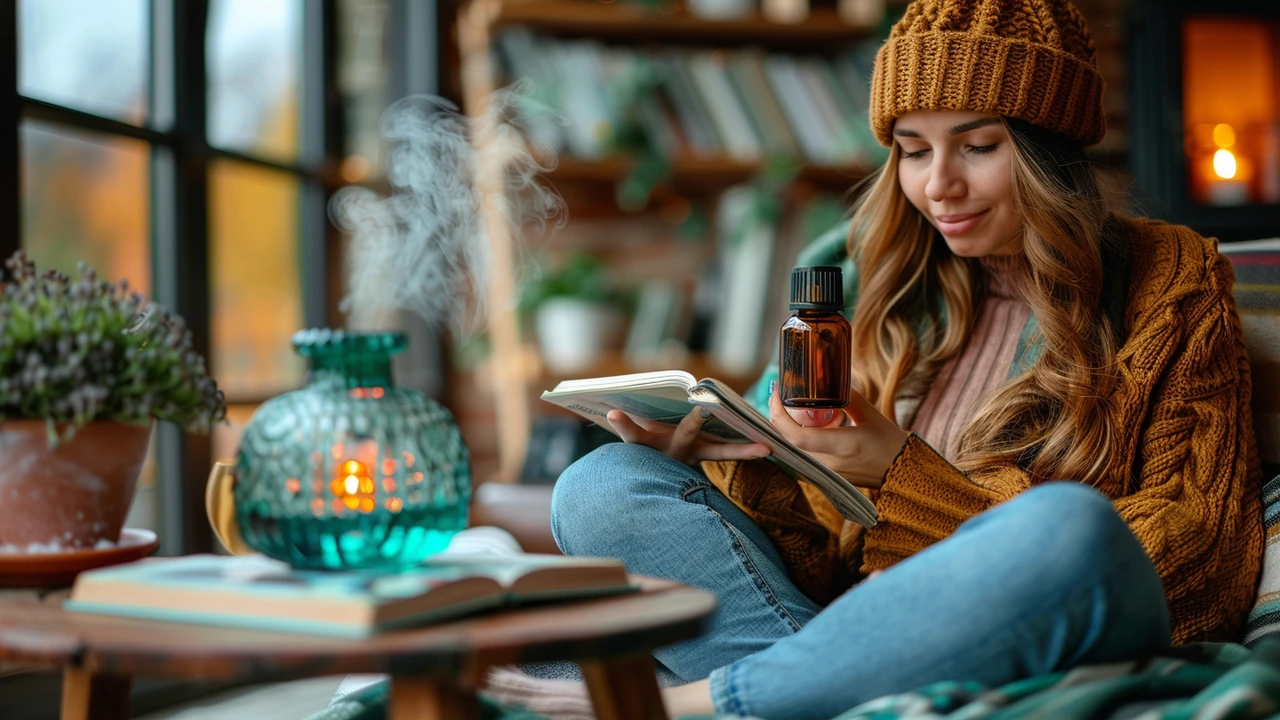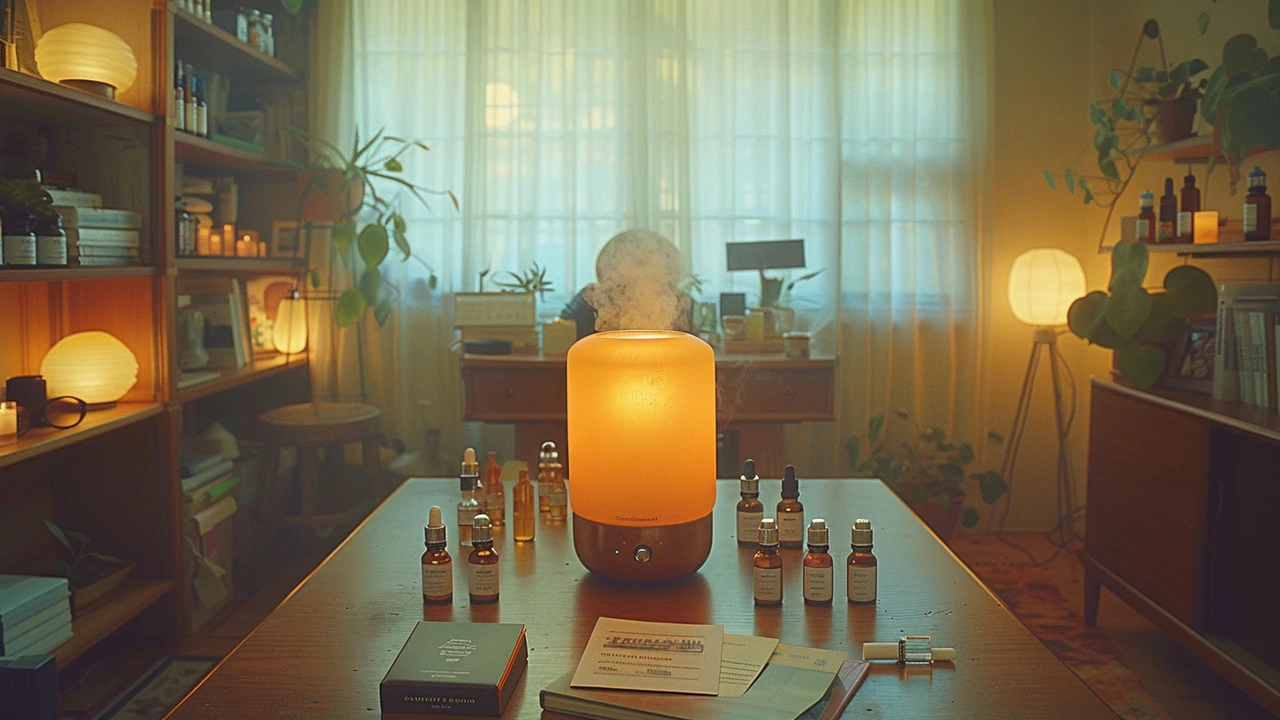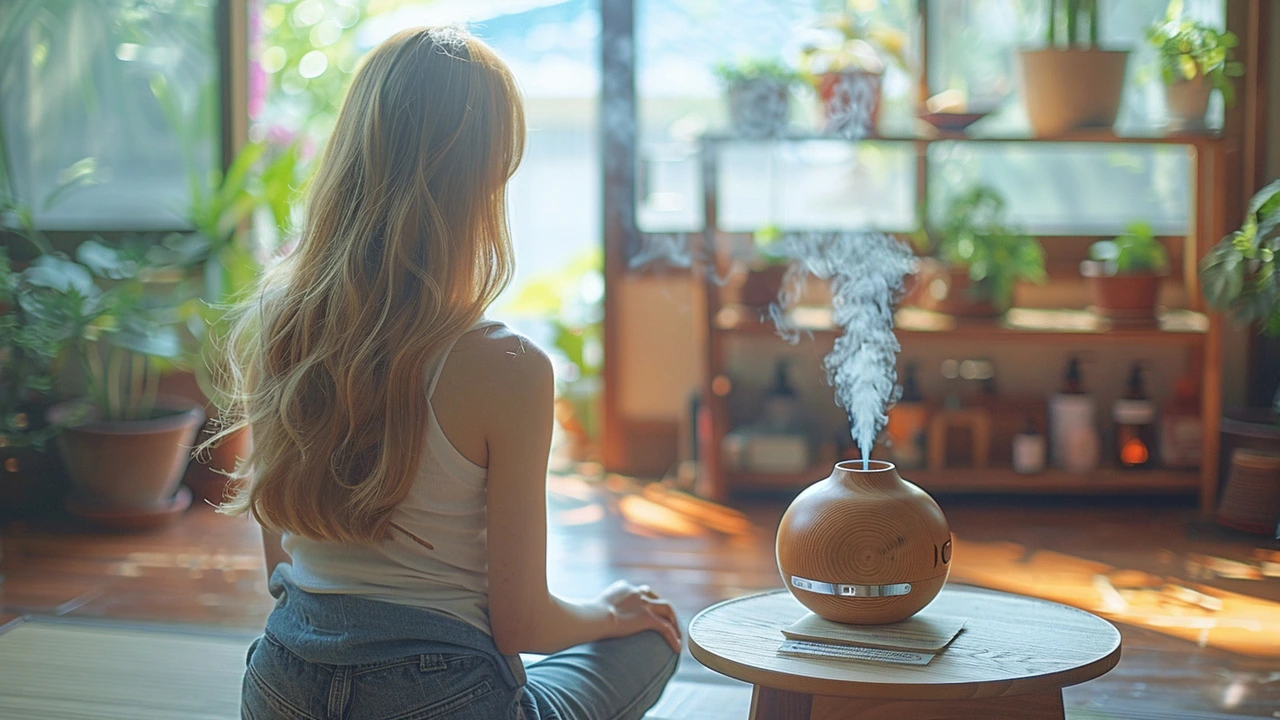In today's fast-paced world, finding natural and effective ways to support mental health is more important than ever. Aromatherapy, the use of fragrant essential oils, offers a simple yet powerful way to enhance emotional well-being.
Aromatherapy taps into the powerful connection between our sense of smell and our emotions. Different scents can evoke a range of feelings, from calm and relaxation to energy and alertness. This article delves into how aromatherapy works and why it can be a beneficial tool in maintaining mental health.
- The Basics of Aromatherapy
- How Scents Impact the Brain
- Popular Essential Oils and Their Benefits
- Scientific Evidence and Studies
- Practical Tips for Using Aromatherapy
- Personal Stories and Experiences
The Basics of Aromatherapy
Aromatherapy is a holistic healing treatment that uses natural plant extracts to promote health and well-being. Sometimes referred to as essential oil therapy, aromatherapy uses aromatic essential oils medicinally to improve the health of the body, mind, and spirit. It enhances both physical and emotional health.
The practice of aromatherapy dates back to ancient civilizations such as Egypt, China, and India, where essential oils were used for religious purposes, medical treatments, and even for embalming. The term itself was coined in the early 20th century when a French chemist, René-Maurice Gattefossé, discovered the potential of lavender oil in healing burns.
Essential oils are concentrated extracts harvested from plants. Healing botanicals are distilled or expressed from flowers, leaves, bark, and roots into potent oils that carry the plant's essence. Each type of essential oil has unique chemical compositions that affect different areas of the brain and body. These oils are typically inhaled or diluted and applied to the skin.
When inhaled, the scent molecules in essential oils travel from the olfactory nerves directly to the brain, impacting the amygdala, the brain’s emotional center. In this way, scents can profoundly affect mood and stress levels. This form of therapy can be administered through various methods such as diffusers, spritzers, inhalers, and bath products.
"Aromatherapy is one of the fastest-growing fields in natural health. It's powerful because it works directly on the brain and influences the emotions," says Dr. Timothy Miller, an expert in homeopathic medicine.
Apart from inhalation, topical application is another popular method. When applied to the skin through massage oils, lotions, or compresses, the essential oils are absorbed and travel through the bloodstream to the different parts of the body, providing both local and systemic benefits. It's crucial to dilute essential oils before applying them to the skin to avoid irritation.
One of the most appealing aspects of aromatherapy is its simplicity and accessibility. With a few basic essential oils, anyone can create a personalized plan to manage stress, improve sleep, boost mood, or enhance focus. Essential oils such as lavender, peppermint, eucalyptus, and lemon are commonly used because of their versatile benefits.
Aromatherapy is not without its precautions. Essential oils are powerful and should be used with care. Some people might experience allergic reactions or sensitivities. It's always advisable to perform a patch test and consult with a healthcare provider, especially for children, pregnant women, and those with underlying health conditions.
In brief, aromatherapy's holistic nature and its ability to support emotional and physical well-being make it a valuable addition to anyone's health regimen. Whether you are looking for **stress relief**, mood enhancement, or simply a way to add a touch of luxury to your daily routine, the basics of aromatherapy provide a compelling case for its use in mental health support.
How Scents Impact the Brain
Have you ever caught a whiff of freshly baked bread and instantly felt cozy and nostalgic? Or perhaps the smell of lavender made you feel relaxed? Scents have a powerful ability to influence our emotions and mental state. This isn't just a figment of our imagination; it's deeply rooted in the way our brain processes smells.
When we inhale a scent, it travels through the olfactory system and straight to the brain's limbic system, which is responsible for emotions and memory. This direct connection helps explain why certain smells can trigger memories or influence our mood so quickly. The limbic system includes the amygdala, which is linked to our emotional responses, and the hippocampus, which plays a role in memory formation.
The science behind this is fascinating. According to neuroscientists, when you breathe in essential oils, the molecules enter the nasal cavity and stimulate smell receptors. These receptors then send signals to the olfactory bulb, which processes the scent and sends information to different parts of the brain. This process happens almost instantaneously, which is why aromatherapy can have a rapid effect on mood and emotional well-being.
Dr. Alan Hirsch, a neurologist and psychiatrist, once said, "Smell is a potent wizard that transports you across thousands of miles and all the years you have lived." His research supports the idea that scent can have a significant impact on both short-term and long-term emotional health.
Each essential oil can evoke a different response. For instance, lavender is well-known for its calming properties, making it a popular choice for stress relief and better sleep. On the other hand, peppermint is invigorating and can help improve focus and reduce fatigue. These effects are more than just anecdotal; studies have shown measurable changes in brain activity and even physiological responses like heart rate and blood pressure after exposure to certain scents.
Let's delve into how specific scents can affect the brain. For example, jasmine has been found to increase beta waves in the brain, which are linked to alertness and improved mood. Rose oil has been shown to reduce cortisol levels, a hormone associated with stress. Using aromatherapy effectively means understanding the unique properties of each essential oil and how they interact with the limbic system.
Interestingly, a study conducted at Kyoto University found that inhaling certain scents can even enhance cognitive function. Participants who were exposed to the aroma of rosemary showed improved memory and concentration. Similarly, the scent of lemon has been linked to increased serotonin levels, which can help lift your mood and provide a sense of well-being.
It's clear that our olfactory senses play a crucial role in our mental health. By harnessing the power of essential oils, aromatherapy offers a natural and accessible way to influence our psychological state. Whether you're looking to reduce stress, improve focus, or simply feel more energized, incorporating aromatherapy into your daily routine may be a game-changer.

Popular Essential Oils and Their Benefits
Essential oils are more than just pleasant aromas; they are potent plant extracts capable of influencing our mood and mental state. Different oils have distinct properties and benefits, making each unique in its influence on mental health. Let's explore some of the most popular essential oils and what they can do for you.
Lavender
Lavender oil is renowned for its calming and relaxing effects. It's often used to reduce stress, anxiety, and promote sleep. The gentle floral scent of lavender can help quiet the mind. Research has shown that lavender essential oil can reduce severe stress and improve sleep quality. In a study published in the Journal of Evidence-Based Complementary & Alternative Medicine, patients who used lavender essential oil aromatherapy reported lower stress and better sleep.
Peppermint
Peppermint oil invigorates and energizes the mind. Known for its refreshing scent, it helps to clear the head and improve focus. Some find that inhaling peppermint oil can relieve mental fatigue and boost concentration. A study published in the International Journal of Neuroscience found that peppermint oil enhanced memory and alertness in test subjects.
Eucalyptus
Known for its strong, crisp aroma, eucalyptus oil can help clear the mind and reduce mental fog. Inhaling eucalyptus oil helps improve respiratory function, which can indirectly enhance mental clarity. This essential oil is often used in steam rooms and spas for its revitalizing properties. Using eucalyptus oil can be especially helpful during the cold season when feeling congested or sluggish.
Rosemary
Rosemary oil is another essential oil that benefits the mind. It is often used to boost memory and cognitive function. Students and professionals alike find it helpful for studying and work. A study published in Therapeutic Advances in Psychopharmacology found that rosemary oil can significantly enhance the quality of memory and alertness.
Chamomile
Chamomile oil is famous for its calming effects, similar to lavender but with a sweeter, herbaceous scent. It's effective in reducing anxiety and promoting relaxation. Chamomile oil is also often used in treating insomnia, making it perfect for nighttime use. A
quote from one esteemed aromatherapist reads, 'Chamomile oil is a gentle sedative, perfect for calming even the most anxious minds.'
Bergamot
Bergamot oil, derived from the peel of a citrus fruit, is excellent for those struggling with depression and anxiety. Its bright, citrusy scent has uplifting properties that can improve mood. There’s strong evidence for its effectiveness; a study in Frontiers in Pharmacology found that bergamot essential oil inhalation significantly reduced anxiety in patients waiting for surgery.
These are just a few examples of how essential oils can benefit mental health. Whether you diffuse them in your home, add them to a bath, or mix them with a carrier oil for a relaxing massage, the therapeutic properties of these oils can be a powerful tool for maintaining mental wellness.
Scientific Evidence and Studies
The connection between aromatherapy and mental wellness isn't just folklore; it's supported by an array of scientific research. Several studies and trials have been conducted to explore how specific essential oils affect mood, stress levels, and overall mental health.
One of the groundbreaking studies was published in 2013 in the journal Evidence-Based Complementary and Alternative Medicine. This research demonstrated that lavender oil could significantly reduce anxiety and improve sleep quality in patients with anxiety disorders. Participants who inhaled lavender oil reported feeling calmer and more relaxed.
Another notable study from 2005, conducted by the Memorial Sloan Kettering Cancer Center, revealed the beneficial effects of peppermint and orange oils in reducing anxiety in patients awaiting surgery. The study found that patients exposed to these oils reported lower anxiety levels compared to those in a control group, highlighting the potential of aromatherapy in clinical settings.
According to Dr. Gary Schwartz, a prominent psychologist, "Aromatherapy taps into the limbic system, which is the part of the brain responsible for emotions and memory. This explains why certain scents can evoke strong feelings and memories."
Moreover, a study published in the journal Physiology & Behavior indicated that rosemary oil could enhance cognitive performance and elevate mood. Participants who inhaled rosemary oil before a test performed better and felt more alert, showcasing the cognitive benefits of aromatherapy.
The benefits of aromatherapy go beyond anecdotal evidence. In a 2016 meta-analysis published in the journal Journal of Advanced Nursing, multiple trials confirmed that essential oils like bergamot, chamomile, and ylang-ylang could effectively reduce symptoms of depression and anxiety when used in massages and baths.
Practical Applications in Everyday Life
These studies suggest that aromatherapy can be a powerful tool not just for clinical purposes but also for everyday mental wellness. Incorporating essential oils into daily routines can potentially enhance mood and reduce stress, making it easier to navigate the ups and downs of life.
For example, diffusing essential oils in your home or workplace can create a calming environment, while adding a few drops of lavender or chamomile oil to your bath can make for a more relaxing experience. Even carrying a small bottle of your favorite essential oil can provide a quick and convenient way to manage stress on the go.
It's important to note that while aromatherapy offers numerous benefits, it should not replace traditional treatments for mental health conditions. Always consult with a healthcare provider before making significant changes to your mental health care routine.

Practical Tips for Using Aromatherapy
When diving into the world of aromatherapy, there are numerous ways to integrate it into daily life. One of the simplest methods is through direct inhalation. Using a diffuser, either electric or reed-based, can help disperse essential oils into the air, creating a calming atmosphere at home. Just add a few drops of your chosen oil to water in the diffuser, and let it run for a few hours.
Another practical approach is topical application. Essential oils can be added to carrier oils like almond or coconut oil and then applied to the skin. This can be particularly effective for localized issues, such as muscle pain or headaches. Always make sure to patch test any new oil on a small area of skin to check for allergic reactions.
For those who are constantly on the go, portable aromatherapy items like roller balls or necklaces can provide a quick boost. Roller balls are small and easy to carry, allowing you to apply your favorite blend to your wrists or temples as needed. Aromatherapy necklaces, which hold a small amount of essential oil, can be worn throughout the day for continuous exposure.
Creating a Routine
Consistency is key when using aromatherapy for mental health. Try incorporating essential oils into your daily routines. For example, adding a few drops of lavender or chamomile oil to your evening bath can help unwind after a busy day. In the morning, consider using energizing oils like peppermint or citrus in the shower to start the day with a burst of energy.
It's also helpful to create a specific space for aromatherapy. Whether it’s a corner of your living room or a dedicated space in your bedroom, setting aside a calm environment can enhance the effects of essential oils. A few drops of eucalyptus or sandalwood in the diffuser can make this space feel serene and inviting.
According to a study published in the Journal of Alternative and Complementary Medicine, regular use of aromatherapy significantly reduced anxiety levels in participants.
Blending different oils can tailor the aromatherapy experience to your specific needs. For relaxation, consider a blend of lavender, bergamot, and ylang-ylang. For focus and concentration, try rosemary, lemon, and peppermint. Experimenting with different combinations can be a fun and rewarding process.
Safety First
It's important to use essential oils safely. Some oils are not suitable for children or pets. Always do thorough research or consult with a professional before introducing new oils into your household. Essential oils should also be stored properly, in a cool, dark place, to maintain their potency.
Pregnant women and people with certain medical conditions should consult their doctors before using aromatherapy. Some oils can have contraindications, so it’s always best to err on the side of caution.
In conclusion, aromatherapy offers a multitude of ways to enhance mental health. By incorporating these practical tips, you can create a nurturing environment that supports emotional well-being. Whether it's through inhalation, topical application, or creating a dedicated space, aromatherapy is a versatile and accessible tool for everyone.
Personal Stories and Experiences
Many individuals have found solace and healing through the simple yet profound practice of aromatherapy. Take Emma, a nurse working in a bustling hospital in Sydney. Day in and day out, she's exposed to high-stress situations, long hours, and emotionally taxing events. Over time, the constant stress began to take a toll on her mental health. A friend recommended aromatherapy, and somewhat skeptically, she decided to give it a try.
Emma started with lavender essential oil, known for its calming properties. She would diffuse it each night as she prepared for bed. To her surprise, she noticed a significant improvement in her sleep quality within the first week. The lavender not only helped her fall asleep faster but also gave her a deeper, more restful sleep. Within a month, she felt a noticeable reduction in her overall anxiety levels, which helped her face each new day with renewed energy and positivity.
Another heartfelt story is from Mark, a 45-year-old businessman from Melbourne. The pressures of running his own company had him stretched thin. Multiple deadlines, high-stakes negotiations, and the constant need to innovate left him feeling chronically stressed and burnt out. After reading about the potential benefits of aromatherapy for mental health, Mark decided to try using peppermint oil during work hours.
He placed a small diffuser on his desk and added a few drops of peppermint oil, known for its invigorating and focus-enhancing properties. The immediate effect was both subtle and profound. The refreshing scent helped clear his mind, allowing him to tackle tasks with a newfound clarity. Over time, he reported fewer instances of mental fatigue and a more sustained level of productivity throughout the day. His experience showcases how powerful the link between scent and cognitive function can be.
For Stephanie, a mother of two from Darwin, integrating aromatherapy into her routine became a family affair. Her children, particularly during exam periods, often grappled with stress and focus issues. She introduced them to rosemary and lemon essential oils which are known for their focus-boosting and anti-anxiety benefits. They would study with a blend diffusing in the background, and the improvement was palpable. The children found it easier to concentrate, retain information, and stay calm under pressure. This simple practice turned out to be a natural way for the whole family to enhance both their mental wellness and their performance.
Personal stories like these are complemented by broader, collective experiences. A survey conducted by the National Association for Holistic Aromatherapy found that 75% of participants felt a significant improvement in their overall mental well-being after incorporating aromatherapy daily. These findings highlight the powerful impact scent can have on our mental and emotional states.
Sharing stories and experiences not only underscores the benefits but also provides a sense of community and shared learning. Everyone's journey with aromatherapy can be unique, influenced by personal preferences, specific mental health challenges, and the choice of essential oils. Hearing how others have navigated their paths can be inspiring and encouraging for those just starting out.


 Health and Wellness
Health and Wellness